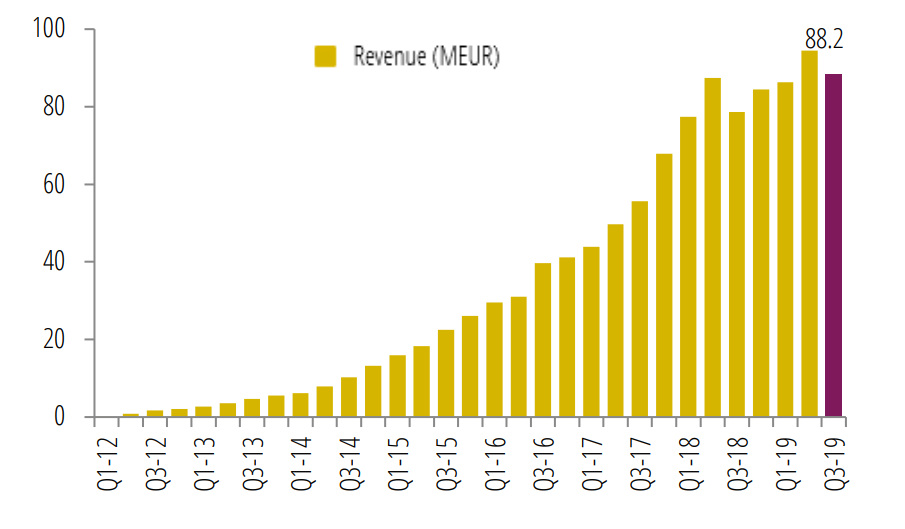Mobile gaming group LeoVegas saw revenues increase 12 per cent in Q3, with 50 per cent of total net gaming revenue now coming from locally regulated markets.
Total revenue in the three-month period was €88.2m, up from €78.6m on the corresponding reporting period in 2018. Organic growth in local currencies was a touch higher, at 13 per cent. Performance was strong in key markets including Sweden, Finland, Denmark and Italy. The UK was also strong but LeoVegas noted that its Royal Panda brand performed “poorly” in the market.
NGR from locally regulated markets was 50 per cent, up from 35 per cent in Q3 2018, the operator said. The number of depositing customers in the period was also up year on year, climbing five per cent to 334,042.
New depositing customers fell, however, down four per cent to 135,019 while returning depositing customers jumped 12 per cent to nearly 200,000.

Operating profit (EBIT) was €6m, down from €3.5m, while adjusted EBIT was €10.2m (€7.7m), corresponding to an adjusted EBIT margin of 11.5 per cent, up from 9.8 per cent.
Reflecting on the results, CEO Gustaf Hagman said in a statement: “We continued to show progress during the third quarter in a difficult-to-navigate environment and generated
double-digit growth in both sales and operating profit.

“Greater regulatory complexity in several of our main markets has given rise to certain short-term challenges but is also raising the barriers to succeed in the sector which benefit established companies.
“Growth was favourable during the period in most of our markets, including Sweden where we are gaining market shares, but also in key markets such as Finland, Denmark and Italy. The UK is profitable at Group level but remains challenging, where Royal Panda in particular had poorer performance during the quarter,” said Hagman.
“We chose to not apply for a licence in Switzerland, where we stopped accepting business on July 1, based on commercial rationale. Meanwhile in Germany we are facing challenges related to the elimination of a key payment solution, which is affecting both our revenue and new customer acquisition during the quarter.”
Turning to the re-regulated Swedish market, where LeoVegas was initially granted a two-year gaming licence in Sweden – a decision that was appealed and extending two to five years, Hagman said: “Our returning customers in Sweden are at all-time high, which is proof that our focus on the product and customer experience coupled with a commitment to responsible gaming is paying off in a regulated environment.
“We estimate that channelisation of online casino in Sweden is far below the Swedish Gambling Authority’s goal of 90 per cent. We therefore look positively upon the fact that the Gambling Authority to a greater extent has begun prioritising measures to curb unlicensed actors.
“Thus far during the year LeoVegas has launched operations in five new markets, where Japan is the most recent addition. We want to especially highlight the launch in Spain, which so far has exceeded our expectations. The online growth in Spain is considerable, and we are highly confident that Spain can become one of our key markets.”
With regard to the Netherlands, where the regulator handed LeoVegas a fine recently, the operator said it would appeal the decision while hopefully the market would finally open “most likely at the start of 2021”.










